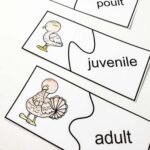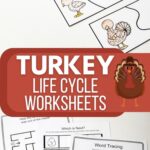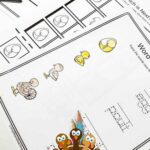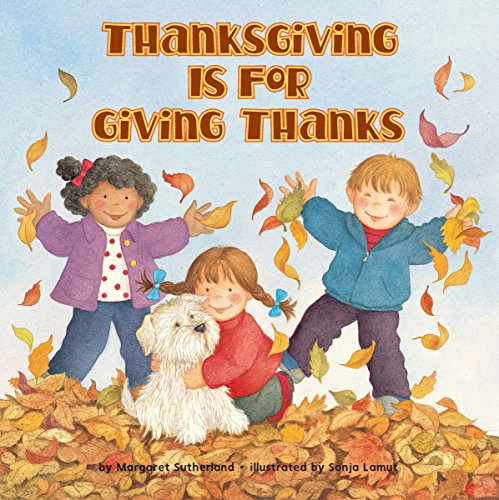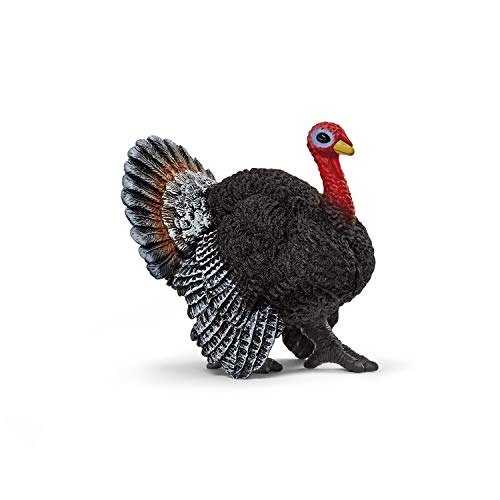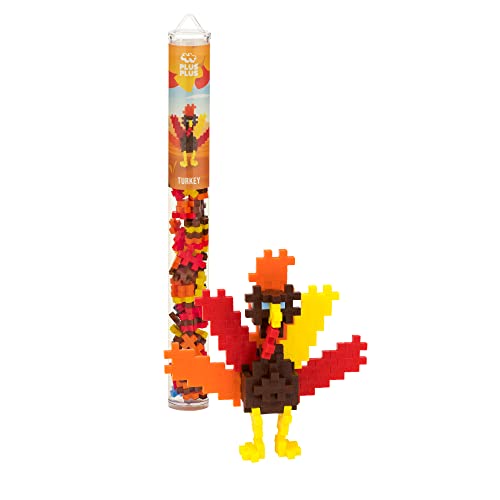Turkey Life Cycle Worksheets
With fall comes some famous holidays that feature a turkey as the main event. As delicious as that might sound, have your kids ever wondered where the turkey comes from? Make these turkey life cycle worksheets a part of your fall holiday preparation! And learn more about where our famous fall feathered friend comes from!
If you like this activity, check out my list of awesome Turkey Activities for Kids.
Turkeys come in the wild and tame variations, and both are large birds. The domesticated turkey is known for its large, colorful tail feather display, but did you know the wild turkey also has large tail feathers? In fact, because the wild turkey is a longer-legged, leaner version compared to its domesticated cousin, the wild turkey’s tail feather display may be more easily seen.
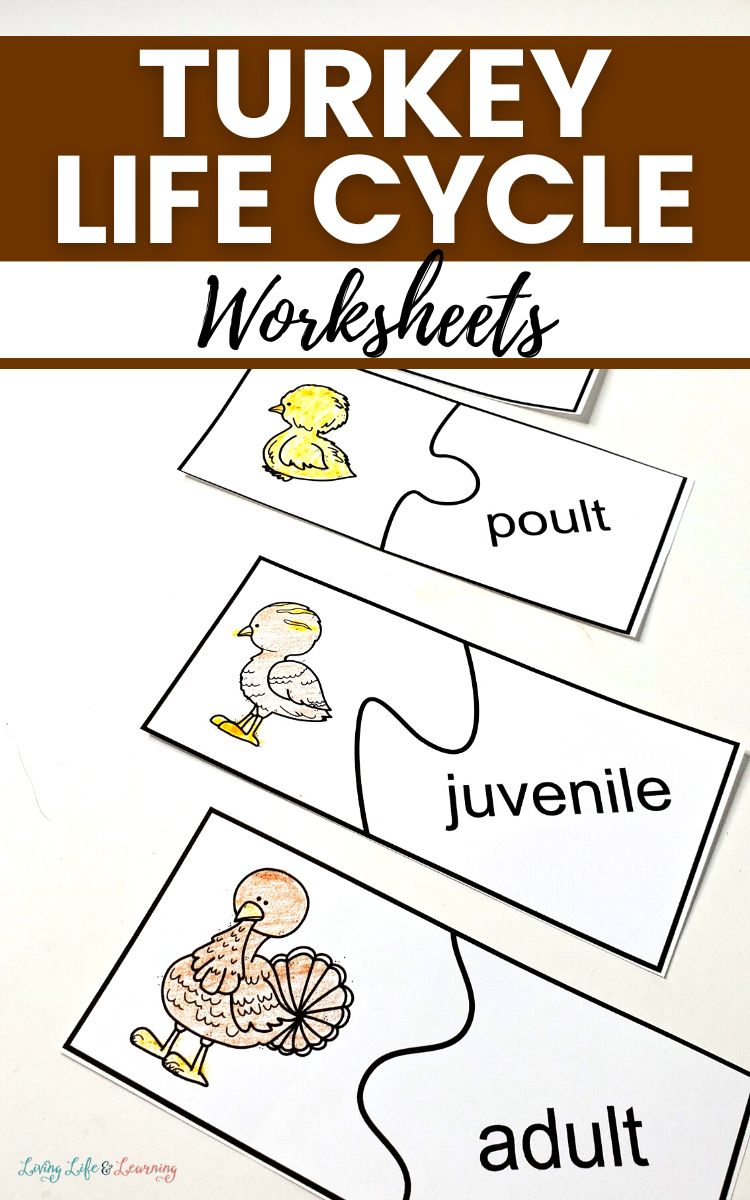
This post may contain affiliate links meaning I get commissions for purchases made through links in this post. Read my disclosure policy here.
What are the stages of a turkey life cycle?
There are four stages to a turkey lifestyle: egg, poult, juvenile, and adult.
The egg takes 28 days to hatch. The hen lays her eggs in a depression on the ground that is covered in dead leaves or vegetation from the surrounding area. A hen can lay 4 up to 17 eggs in a clutch.
She only lays one egg per day so it can take up to two weeks to finish laying a clutch of eggs.
When an egg hatches it is not a chick, it is called a poult. A poult will stay with its mother to learn to eat and find food. Poults are born ready to run, they must keep up with their flock so that they are not left behind.
Wild turkeys cover a lot of territory when looking for food.
The male turkeys are known as Toms or Gobblers because of the noise they make when trying to attract a mate. They have large tail feathers that they strut around with to make themselves attractive to females. They are larger than the females and have sharp struts on their legs to help them fight.
Hens are smaller and less ornate. They rely on hiding from predators and are less colorful.
Males and females live in their own flocks until the mating season.
>> See more life cycle worksheets for kids
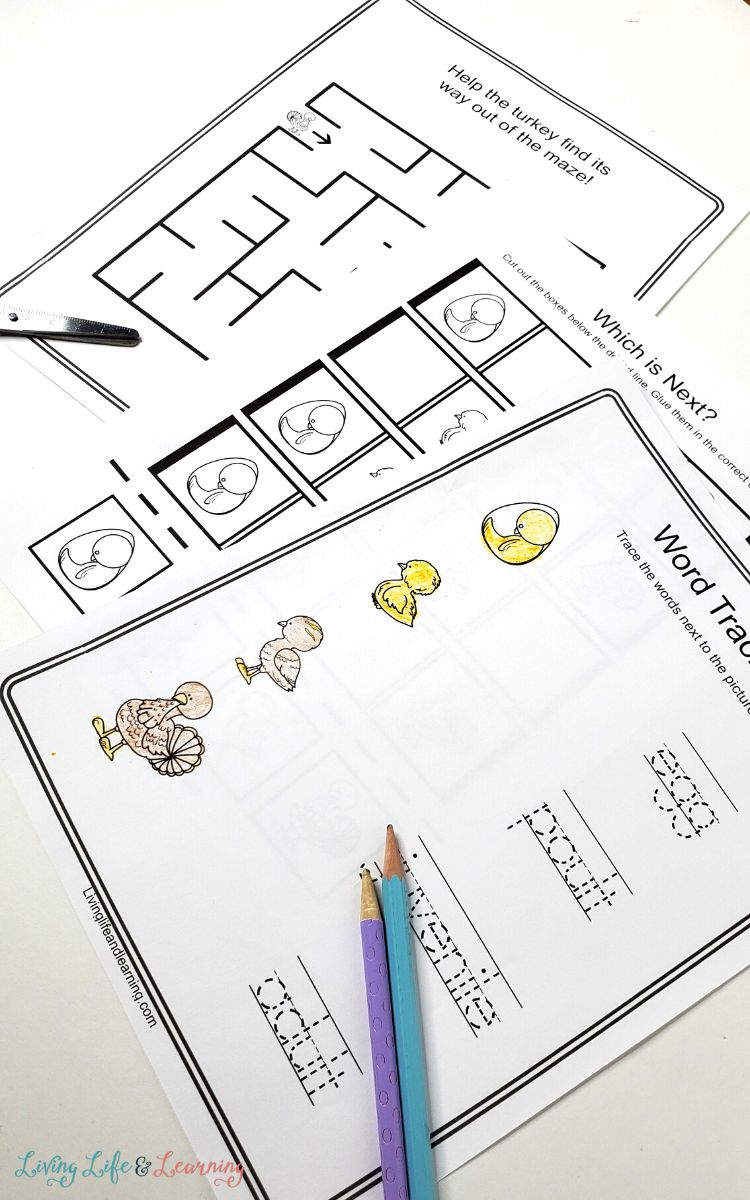
Turkey Life Cycle Worksheets Supplies
- Printer (I have this one)
- Paper
- Pencil
- Scissors
- Crayons
Fun Facts About Turkeys
Why do turkeys spread their tail feathers?
Male turkeys, called “toms” or “gobblers” spread their tail feathers to show off to potential mates. Turkeys are related to peacocks, so the tail feathers serve a similar purpose. The more elaborate the display, the better the chances for that particular turkey to find himself a partner! But turkeys don’t mate for life, so female turkeys are left to raise the next generation on their own.
>> See more fun life cycle for kids
Where do turkeys nest?
Chickens nest in roosts, and ducks nest in the reeds. Turkeys create shallow nests on the ground! When a female turkey, called a “hen” is ready to lay her eggs, sometime in late spring, she digs a shallow hole. It’s not very deep, but it can be up to 10 inches wide, and looks kind of like a dinner plate!
Then she lays her eggs — about 9 to 13 of them at a time, in a “clutch”. She will sit on her eggs for about 28 days.
Can turkeys fly?
Wild turkeys can fly short distances, and they can run really fast. They can even outrun a galloping horse for a short distance! Wild baby turkeys can’t fly for the first two weeks after they hatch, though, so their mother keeps them in a hidden place on the ground until they can.
Farm turkeys don’t fly or run that fast. After all, we don’t want our farm animals to get away, right? Mother turkeys still try to hide their chicks though, for the first few weeks after they hatch.
What are baby turkeys called?
Baby turkeys are called “poults”. They have soft downy feathers for about 6 weeks after they hatch, until they molt and get adult feathers. Then they’re called “juveniles”, until they’ve grown bigger, and molted a few more times.
>> See more Thanksgiving printables for kids
Recommended Turkey Books
Find out more about the amazing and surprisingly affectionate turkey with some of our favorite books for kids. With these silly stories, your fall family feast will be a fun frolic.
Turkey TroubleHow to Catch a TurkeyTaylor the Tooting Turkey: A Story About a Turkey Who Toots (Farts)Thanksgiving Is for Giving Thanks! (Reading Railroad)Five Silly TurkeysA Plump and Perky Turkey
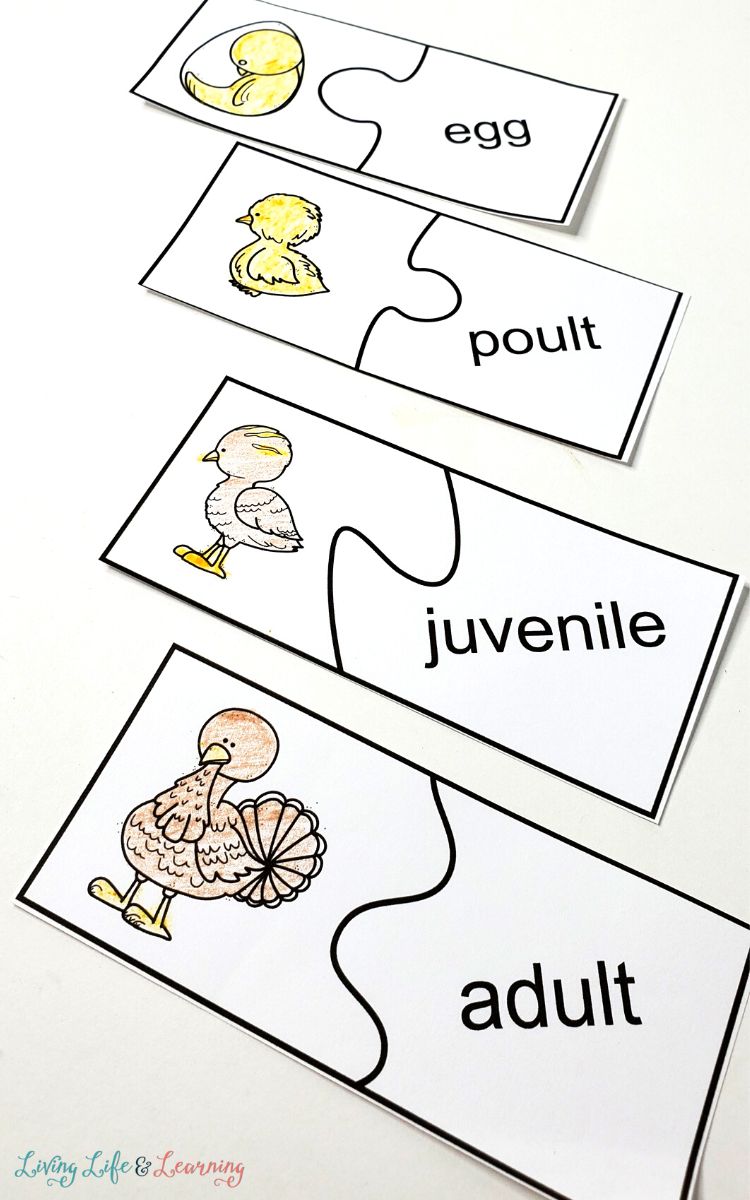
Turkey Life Cycle Worksheets Supplies
- Printer (I have this one)
- Paper
- Pencil
- Scissors
- Glue
I have the HP printer 8710 but it’s not available anymore. It’s been running well for years now. Look for another HP Instant Ink-ready printer so that you can use their program to send you ink cartridges whenever your printer gets low on ink.
Recommended Turkey Toys
Ready to have some fun this fall? Get some of these turkey toys for your child! The perfect way to spend your Thanksgiving holidays.
Schleich Farm World, Animal Toys for Boys and Girls, Realistic Bird, Turkey Toy FigurinePLUS PLUS – Mini Maker Tube – Turkey – 70 Piece, Construction Building Stem Toy, Interlocking Mini Puzzle Blocks for KidsMud Pie Kids Turkey Shaped Floor Puzzle, 21garmelon Thanksgiving Wooden Puzzles Gift for Toddler, 6 Pack Puzzles Thanksgiving Autumn Fall2 Pack Thanksgiving Ring Toss Games Toys for Kids Thanksgiving Inflatable Turkey Hats Toss Games (2 Turkey Hats, 8 Rings)Shappy 12 Pcs Thanksgiving Turkey Bowling Set Including 10 Foam Pins with Black Hat 2 Balls
What’s included in the Turkey Life Cycle Worksheets?
Turkey Life Cycle Puzzle
This engaging worksheet allows children to match the correct word to the corresponding image of each phase in the turkey’s life cycle.
By completing this simple puzzle, children can deepen their understanding of the different stages a turkey goes through from egg to adult. It promotes cognitive development and vocabulary enrichment.
Word Tracing
In this worksheet, children can practice their handwriting skills while learning about the turkey’s life cycle. Each phase is accompanied by a picture, and children can trace the words next to the images.
This activity helps improve fine motor skills, letter recognition, and spelling.
Which is next?
This interactive worksheet encourages critical thinking and sequencing skills. Children are presented with boxes representing the different phases of a turkey’s life cycle, but they are jumbled up.
The task is to cut the boxes below the dotted line and glue them in the correct order. By completing this activity, children strengthen their logical reasoning and understanding of chronological order.
Turkey Maze
This fun-filled worksheet challenges children to help a turkey find its way out of the maze. As they navigate through the twists and turns, they get a chance to reinforce their problem-solving skills and spatial awareness. This activity adds an element of excitement to the learning process.
By including these diverse worksheets in the Turkey Life Cycle printables, children can enjoy a varied and interactive learning experience. Each worksheet focuses on a different skill set, such as matching, tracing, sequencing, and problem-solving.
This comprehensive approach ensures that children not only grasp the concept of the turkey’s life cycle but also develop essential cognitive and motor skills along the way.
If you have a preschooler, I suggest you try these fun turkey preschool activities.
Learn more about turkeys, toms, hens and poults with these fun turkey life cycle worksheets. Download your copy now!
If you have a preschooler and are looking for more science printables to get your child engaged while learning, check out my list of Science Worksheets for Preschoolers!
More Turkey Activities
Toilet Paper Roll Turkey Craft
Turkey Activities for Kindergarten
Best Turkey Books for Preschool
More Life Cycle Activities
Life Cycle of a Horse Worksheet
More Thanksgiving Activities
Thanksgiving Construction Paper Crafts by Homeschool Preschool
Thanksgiving Word List and Handwriting Practice by Darcy and Brian


